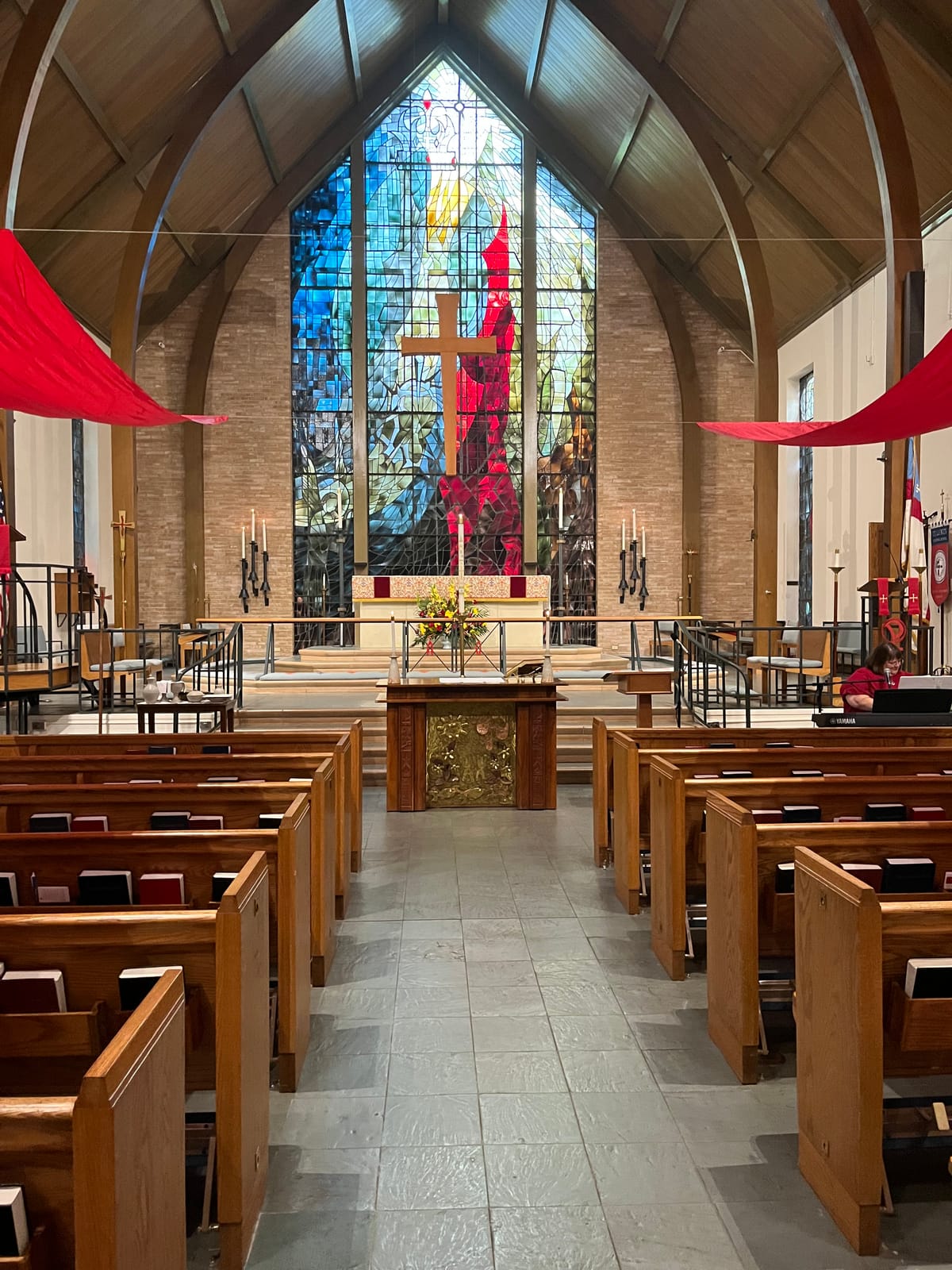3 Reasons I Left Evangelical Churches for the Episcopal Church

I’ve identified as a Christian for almost 20 years and spent 15 years serving in various ministry roles within the Evangelical Church. A lot of baggage comes with unpacking, “What is an evangelical?”
I AM JAMES GÓMEZ is a reader-supported publication. To receive new posts and support my work, consider becoming a free or paid subscriber.
I won’t provide a detailed answer to that question here, but I will share a brief description. The definition of “evangelicalism,” which is where evangelicals come from, is, in my opinion, still best defined according to Bebbington’s quadrilateral.
The four areas of the quadrilateral are:
- Biblicism - The Bible is our ultimate authority and is often seen as God's inerrant and/or infallible word.
- Christocentrism - Jesus is central to faith. Specifically, the belief in the virgin birth, Jesus as the begotten son of God, and Jesus’s death as penal substitutionary atonement are core beliefs.
- Conversionism is a commitment to evangelism and the belief that people must believe in Jesus to be saved.
- Activism - Of the four, this area has seen the most change over time. Today activism most often looks like holding to conservative politics and being “pro-life” or, more specifically, anti-abortion.
Over the last 30-40 years, a few more areas have become associated with evangelical churches. Those areas are:
- A focus on celebrity pastors and/or worship music.
- Operating churches like businesses and following the latest marketing and leadership craze.
- Define church health primarily through attendance. The bigger Sunday attendance is, the healthier the church must be.
For 15 years, this broad tribe is where I served, worshipped, and developed deep relationships. It wasn’t until I experienced the same type of narcissism, ego, pride, and emphasis on platform building in three different churches, each a different size and context, as well as each having culturally diverse leadership teams, but all with the same toxic culture, that I knew I needed to walk away. Here are the three reasons I left evangelical churches for the Episcopal Church.
1. The Episcopal Church Focuses on God, Not the Pastor
I remember growing up thinking it was so odd that there were pastors on tv with fancy suites, jewelry, book deals, and people who associated churches with the preacher. At the time (the mid-90s), it was men like Jesse Duplantis, Benny Hinn, Creflo Dollar, and Kenneth Copeland who were what I thought were celebrity-seeking prosperity-preaching outliers.
Though the evangelical tribe I come from would gasp at the thought of being compared to anything associated with the prosperity gospel, the reality is that the marketing and emphasis on platform building are the same. Today’s evangelical pastors may not wear suits and leather shoes, but it’s only because they’ve exchanged them for Jordans and modern farmhouses.
It’s common in evangelical churches to say things like, “I go to (insert pastor’s name) church.” The justification for building up the pastor's name and brand is the idea that if the pastor becomes more popular, then more people will come to the church. When the only health metric is attendance, it’s easy to convince yourself that the ends justify the means.
So much of the evangelical church service is focused on the pastor, with God being a second or third priority at best. In an hour-long service, the pastor will be the center of attention through his (evangelicals are particular, the pastor must be a he) standing center stage preaching. It’s common for people to determine whether they’ll stay at church solely based on the personality and preaching style of the pastor. This often sounds something like this:
- This pastor is a great storyteller and pulls on my heartstrings every Sunday? I love this church!
- This other pastor is too heady and has a dry personality; this church must not be for me.
Because so much rides on the pastor being “the guy,” they become the final say, the king or a little pope in a more religious sense. With this much influence and sway, it shouldn’t be surprising that many pastors become narcissists who lead the church as oligarchs.
The pastor-centered emphasis doesn’t exist in the Episcopal church, at least not nearly to the extent it does in the evangelical church. I love attending church on Sunday and my Reverands not being the center of attention. Through the liturgy, God is kept at the center of worship.
From prayer to Bible readings to singing and taking communion, 90% of Sunday worship is corporate, with only God being the focus. The one exception is the sermon, which is maybe 15 minutes of an hour-long service. I LOVE attending church and being reminded of our intimacy with God through the different ways the church worships collectively.
2. The Episcopal Church Embraces a Wide Theological and Social Spectrum
I now want to make explicit what I alluded to through Bebbington’s Quadrilateral. Within the evangelical church are specific doctrines and theological convictions church members are expected to have.
Questioning anything deemed a “core” or “closed-handed” doctrine is highly discouraged. Questions are seen as a lack of faith, and if you lack faith, then leadership may call into question if you’re even a Christian.
In reality, your Christian faith is a coded way of calling into question your loyalty to the tribe. It’s a way of pressuring you to align with the in-group before your questions make you a part of the out-group.
The expectation that church members hold to narrow understandings of God is also applied to many social issues. In my experience, this most often looks like:
- The expectation to vote Republican as a way to confirm your anti-abortion (pro-life) conviction.
- Though there’s a spectrum about same-sex relationships, the consensus belief is marriage is only between a man and a woman.
- Most churches reject the idea of universal healthcare, universal childcare, a livable wage, or a general increase in a social safety net.
If I can be vulnerable for a moment, I still struggle deeply with sharing publicly the questions I’m processing or the social views I hold out of fear of how other Christians will judge me.
Though we still have a long way to go, my family has found substantial healing in the Episcopal church. I’ve shared questions and thoughts with my Priest that I know I would get in trouble for historically. Things like, “What if I don’t believe the Bible is this perfect book God gave us?” I love that my Priest encourages my questions and affirms my desire to learn. She’s amazing.
I’ve found that Episcopalians are all over the theological and social spectrum. As a result, they don’t claim to have a monopoly on truth. They tend to be open to different perspectives, embrace questions, and encourage exploration.
One of the most impactful things our family has experienced has been worshipping with same-sex families who felt like they belonged as much as anyone else in the church. They could be themselves openly and unashamedly. It’s refreshing to know what ties us together is Jesus and a genuine desire to experience the love of God. Everything else we can disagree about, that’s ok. We can discuss our differences and keep loving each other.
3. The Episcopal Church is Sacramental
Similar to the late New Testament Scholar Marcus Borg, I believe the Bible and the gospels are a lens through which we can learn about the truths of the Christian experience. However, at a deeper level, I believe the Christian tradition is more than a lens. It’s a sacrament. Marcus Borg explains the Christian tradition as a sacrament this way:
“A sacrament is a means of grace, a mediator of the sacred. More than a lens through which we see, that tradition is a sacrament that mediates to us that which we behold…Being Christian is not about believing, but about a relationship with God who is sacramentally mediated to us through the Christian tradition.” (The Meaning of Jesus: Two Visions, p. 250)
If the Christian tradition is a sacrament that brings us closer to God, then the Episcopal church, as a sacramental tradition, magnifies that experience. At the end of the day, I left the evangelical church for the Episcopal Church because it is where I’ve most intimately experienced God.
I AM JAMES GÓMEZ is a reader-supported publication. To receive new posts and support my work, consider becoming a free or paid subscriber.




